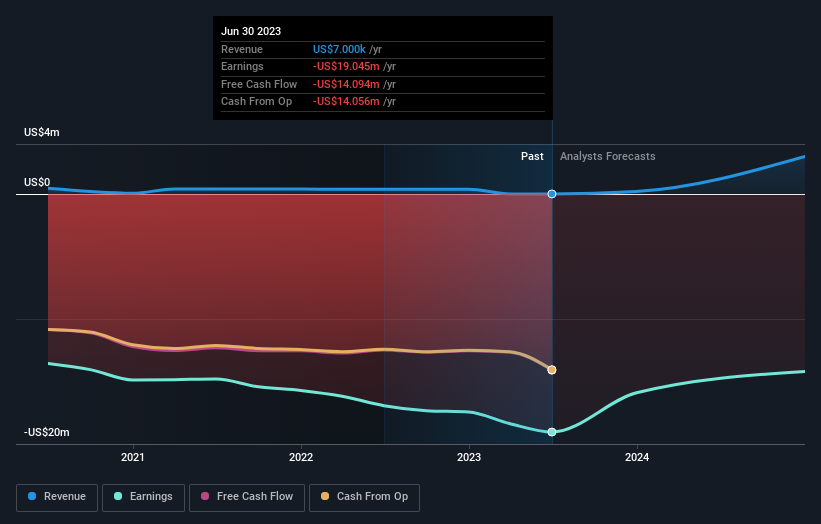Atomera Incorporated's (NASDAQ:ATOM) top owners are retail investors with 59% stake, while 31% is held by institutions
Key Insights
The considerable ownership by retail investors in Atomera indicates that they collectively have a greater say in management and business strategy
The top 25 shareholders own 32% of the company
Every investor in Atomera Incorporated (NASDAQ:ATOM) should be aware of the most powerful shareholder groups. We can see that retail investors own the lion's share in the company with 59% ownership. That is, the group stands to benefit the most if the stock rises (or lose the most if there is a downturn).
And institutions on the other hand have a 31% ownership in the company. Institutions will often hold stock in bigger companies, and we expect to see insiders owning a noticeable percentage of the smaller ones.
In the chart below, we zoom in on the different ownership groups of Atomera.
View our latest analysis for Atomera
What Does The Institutional Ownership Tell Us About Atomera?
Institutional investors commonly compare their own returns to the returns of a commonly followed index. So they generally do consider buying larger companies that are included in the relevant benchmark index.
Atomera already has institutions on the share registry. Indeed, they own a respectable stake in the company. This implies the analysts working for those institutions have looked at the stock and they like it. But just like anyone else, they could be wrong. When multiple institutions own a stock, there's always a risk that they are in a 'crowded trade'. When such a trade goes wrong, multiple parties may compete to sell stock fast. This risk is higher in a company without a history of growth. You can see Atomera's historic earnings and revenue below, but keep in mind there's always more to the story.
We note that hedge funds don't have a meaningful investment in Atomera. The company's largest shareholder is The Vanguard Group, Inc., with ownership of 5.4%. For context, the second largest shareholder holds about 5.2% of the shares outstanding, followed by an ownership of 3.6% by the third-largest shareholder. In addition, we found that Scott Bibaud, the CEO has 1.3% of the shares allocated to their name.
A deeper look at our ownership data shows that the top 25 shareholders collectively hold less than half of the register, suggesting a large group of small holders where no single shareholder has a majority.
Researching institutional ownership is a good way to gauge and filter a stock's expected performance. The same can be achieved by studying analyst sentiments. There is a little analyst coverage of the stock, but not much. So there is room for it to gain more coverage.
Insider Ownership Of Atomera
While the precise definition of an insider can be subjective, almost everyone considers board members to be insiders. The company management answer to the board and the latter should represent the interests of shareholders. Notably, sometimes top-level managers are on the board themselves.
I generally consider insider ownership to be a good thing. However, on some occasions it makes it more difficult for other shareholders to hold the board accountable for decisions.
Our most recent data indicates that insiders own some shares in Atomera Incorporated. It has a market capitalization of just US$189m, and insiders have US$9.4m worth of shares, in their own names. This shows at least some alignment, but we usually like to see larger insider holdings. You can click here to see if those insiders have been buying or selling.
General Public Ownership
The general public -- including retail investors -- own 59% of Atomera. With this amount of ownership, retail investors can collectively play a role in decisions that affect shareholder returns, such as dividend policies and the appointment of directors. They can also exercise the power to vote on acquisitions or mergers that may not improve profitability.
Next Steps:
It's always worth thinking about the different groups who own shares in a company. But to understand Atomera better, we need to consider many other factors. Be aware that Atomera is showing 4 warning signs in our investment analysis , and 1 of those is a bit concerning...
If you would prefer discover what analysts are predicting in terms of future growth, do not miss this free report on analyst forecasts.
NB: Figures in this article are calculated using data from the last twelve months, which refer to the 12-month period ending on the last date of the month the financial statement is dated. This may not be consistent with full year annual report figures.
Have feedback on this article? Concerned about the content? Get in touch with us directly. Alternatively, email editorial-team (at) simplywallst.com.
This article by Simply Wall St is general in nature. We provide commentary based on historical data and analyst forecasts only using an unbiased methodology and our articles are not intended to be financial advice. It does not constitute a recommendation to buy or sell any stock, and does not take account of your objectives, or your financial situation. We aim to bring you long-term focused analysis driven by fundamental data. Note that our analysis may not factor in the latest price-sensitive company announcements or qualitative material. Simply Wall St has no position in any stocks mentioned.


